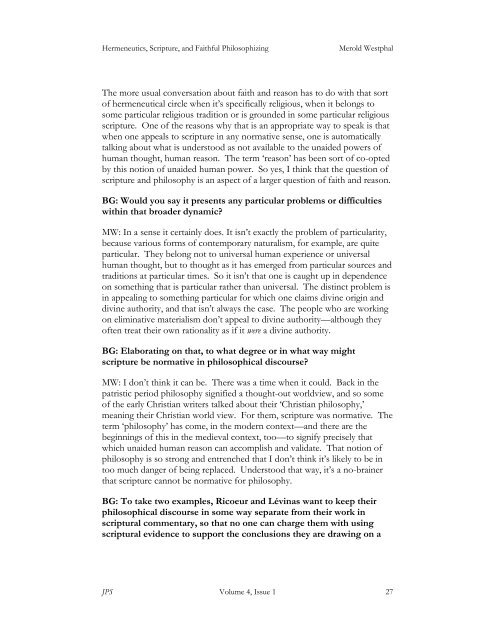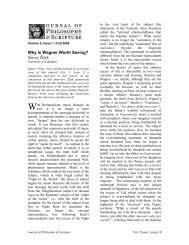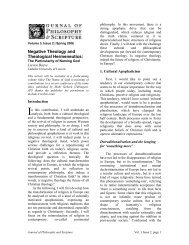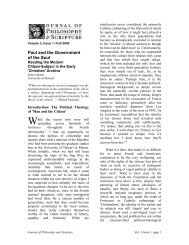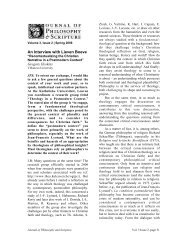interview with Merold Westphal - Journal of Philosophy and Scripture
interview with Merold Westphal - Journal of Philosophy and Scripture
interview with Merold Westphal - Journal of Philosophy and Scripture
Create successful ePaper yourself
Turn your PDF publications into a flip-book with our unique Google optimized e-Paper software.
Hermeneutics, <strong>Scripture</strong>, <strong>and</strong> Faithful Philosophizing <strong>Merold</strong> <strong>Westphal</strong><br />
The more usual conversation about faith <strong>and</strong> reason has to do <strong>with</strong> that sort<br />
<strong>of</strong> hermeneutical circle when it’s specifically religious, when it belongs to<br />
some particular religious tradition or is grounded in some particular religious<br />
scripture. One <strong>of</strong> the reasons why that is an appropriate way to speak is that<br />
when one appeals to scripture in any normative sense, one is automatically<br />
talking about what is understood as not available to the unaided powers <strong>of</strong><br />
human thought, human reason. The term ‘reason’ has been sort <strong>of</strong> co-opted<br />
by this notion <strong>of</strong> unaided human power. So yes, I think that the question <strong>of</strong><br />
scripture <strong>and</strong> philosophy is an aspect <strong>of</strong> a larger question <strong>of</strong> faith <strong>and</strong> reason.<br />
BG: Would you say it presents any particular problems or difficulties<br />
<strong>with</strong>in that broader dynamic?<br />
MW: In a sense it certainly does. It isn’t exactly the problem <strong>of</strong> particularity,<br />
because various forms <strong>of</strong> contemporary naturalism, for example, are quite<br />
particular. They belong not to universal human experience or universal<br />
human thought, but to thought as it has emerged from particular sources <strong>and</strong><br />
traditions at particular times. So it isn’t that one is caught up in dependence<br />
on something that is particular rather than universal. The distinct problem is<br />
in appealing to something particular for which one claims divine origin <strong>and</strong><br />
divine authority, <strong>and</strong> that isn’t always the case. The people who are working<br />
on eliminative materialism don’t appeal to divine authority—although they<br />
<strong>of</strong>ten treat their own rationality as if it were a divine authority.<br />
BG: Elaborating on that, to what degree or in what way might<br />
scripture be normative in philosophical discourse?<br />
MW: I don’t think it can be. There was a time when it could. Back in the<br />
patristic period philosophy signified a thought-out worldview, <strong>and</strong> so some<br />
<strong>of</strong> the early Christian writers talked about their ‘Christian philosophy,’<br />
meaning their Christian world view. For them, scripture was normative. The<br />
term ‘philosophy’ has come, in the modern context—<strong>and</strong> there are the<br />
beginnings <strong>of</strong> this in the medieval context, too—to signify precisely that<br />
which unaided human reason can accomplish <strong>and</strong> validate. That notion <strong>of</strong><br />
philosophy is so strong <strong>and</strong> entrenched that I don’t think it’s likely to be in<br />
too much danger <strong>of</strong> being replaced. Understood that way, it’s a no-brainer<br />
that scripture cannot be normative for philosophy.<br />
BG: To take two examples, Ricoeur <strong>and</strong> Lévinas want to keep their<br />
philosophical discourse in some way separate from their work in<br />
scriptural commentary, so that no one can charge them <strong>with</strong> using<br />
scriptural evidence to support the conclusions they are drawing on a<br />
JPS Volume 4, Issue 1 27


